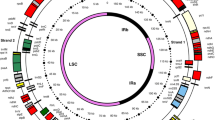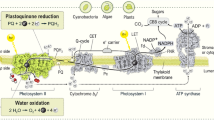Abstract
The major RNA polymerase from mustard chloroplasts is a multi-subunit enzyme consisting of core components and associated factors. Among the latter is a heterotrimeric factor named PTK (plastid transcription kinase) because of its serine/threonine-type protein kinase activity. PTK activity itself depends on its phosphorylation state. In addition, we show that it responds to glutathione but not to other redox-reactive reagents that were tested, and both glutathione and phosphorylation act antagonistically. Using a homologous in vitro system, we find that PTK selectively phosphorylates subunit(s) of plastid RNA polymerase and is involved in determining the level of faithful transcription from the chloroplast psbA promoter. Together, these results establish a role for phosphorylation and redox state in the regulation of plastid gene expression.
Similar content being viewed by others
Author information
Authors and Affiliations
Rights and permissions
About this article
Cite this article
Baginsky, S., Tiller, K., Pfannschmidt, T. et al. PTK, the chloroplast RNA polymerase-associated protein kinase from mustard (Sinapis alba), mediates redox control of plastid in vitro transcription§. Plant Mol Biol 39, 1013–1023 (1999). https://doi.org/10.1023/A:1006177807844
Issue Date:
DOI: https://doi.org/10.1023/A:1006177807844




